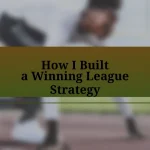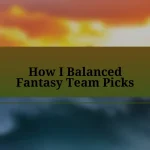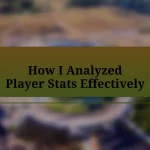Key takeaways:
- Understanding player statistics and situational factors is essential for successful fantasy sports research.
- Community insights and expert opinions enrich research and decision-making processes.
- Developing a personal research strategy, including journaling and collaboration, helps in refining one’s approach to fantasy sports.
Author: Clara Whitmore
Bio: Clara Whitmore is an acclaimed author known for her compelling narratives and rich character development. With a background in psychology and literature, she weaves intricate tales that explore the complexities of human relationships and the nuances of the human experience. Clara’s debut novel, “Echoes of the Past,” garnered critical acclaim and was a finalist for several literary awards. She holds an MFA in Creative Writing from the University of Iowa and frequently conducts workshops and lectures on storytelling. When she’s not writing, Clara enjoys hiking in the mountains and experimenting with new recipes in her kitchen. She lives in Portland, Oregon, with her two rescue dogs and a well-stocked bookshelf.

Understanding fantasy sports research
When diving into fantasy sports research, I’ve found that understanding player statistics is crucial. I remember the first time I overlooked a backup quarterback’s performance, thinking it insignificant. It wasn’t until that player led his team to a winning streak that I learned just how valuable every player’s metrics can be. Have you ever missed out on a key player because you didn’t delve deep enough into their stats?
Moreover, considering a player’s situation—like injuries or team dynamics—can significantly influence their performance. I once invested heavily in a star player who struggled due to lineup changes, leaving me frustrated. This taught me that research goes beyond numbers; it’s about grasping the momentum of the team and the individual. How often do you check for the latest news and updates that can impact your players?
Finally, I cannot stress enough the importance of community insights. Engaging with forums and discussions helped refine my strategy. One time, a fellow sports enthusiast shared a game-changing piece of data about weather conditions affecting gameplay. This kind of collaboration enriches our understanding and reminds me that effective research isn’t just a solo effort but a shared journey with fellow fans. Have you tapped into the wealth of knowledge available through community interactions?

Importance of effective research
Effective research in fantasy sports is critical for making informed decisions. There was a time when I relied solely on popular rankings or advice from friends, which led to a disappointing season. I learned that digging deeper into trends—like home game advantages or historical performance against specific teams—can uncover hidden gems that can set your lineup apart. How many of us have overlooked a player simply because they didn’t fit the conventional mold?
Another aspect that can’t be underestimated is the context surrounding player performance. During one particular season, I focused too much on stats and neglected to consider a player’s mental state after a personal tragedy. It made me realize that the human factor plays a huge role in sports. Have you considered how off-field issues might affect your pick’s game?
Lastly, I’ve come to appreciate that effective research fosters confidence in my choices. The more I know, the more assured I feel when setting my lineup each week. There’s nothing quite like the thrill of watching a well-researched player outperform expectations. Isn’t it exhilarating when all your hard work pays off on game day?

Analyzing player statistics and trends
When analyzing player statistics, I often start by examining advanced metrics like Player Efficiency Rating (PER) or all-encompassing statistics such as War (Wins Above Replacement). These numbers can reveal a player’s true value beyond traditional stats. I remember a season where I leaned heavily on these metrics; it helped me spot an undervalued player who became a league standout, making a significant impact on my team.
Moreover, I pay close attention to trends over time, not just single-game performances. For instance, I once noticed that a running back’s yardage spiked during the latter half of the season due to improved offensive line play. Would I have recognized that without accessing game logs and analytical breakdowns? I doubt it. Staying proactive about analyzing trends can lead to opportunities where others might only see inconsistencies.
On top of that, correlating player performance with environmental factors, such as weather conditions or field type, is essential. During one particularly rainy game, I decided on starting a wide receiver who thrived in wet conditions. The bold choice paid off when he scored a touchdown against all odds. Have you ever thought about how weather might tip the scales in favor of—or against—a player you’re considering?

Utilizing expert opinions and rankings
When it comes to utilizing expert opinions and rankings, I find it incredibly valuable to sift through various analysts’ projections. These experts often provide insights based on experience that can illuminate facets of a player’s performance I might miss. For instance, last season, I came across an article from a well-respected analyst who highlighted an overlooked wide receiver due to his favorable matchup—taking that advice helped me secure a crucial win.
Rankings often serve as a benchmark for decision-making, and I’ve learned to compare them against my own analysis. There was a time when I ignored the consensus ranking of a tight end because I felt he was underperforming. When I later dove deeper, I found that his usage was poised to increase, and I was able to capitalize on that insight just before others caught on. Do you ever find yourself trusting your gut more than the rankings? I think a balance is essential.
Engaging with expert opinions not only enhances my fantasy strategy but also deepens my understanding of the game itself. I remember attending a fantasy sports seminar where industry veterans shared their approaches. I walked away inspired, realizing that blending expert insights with my own research creates a more informed and confident decision-making process. How do you factor in expert opinions when crafting your strategies? For me, it’s all about finding that synergy between professional advice and personal instinct.

Creating a personal research strategy
Developing a personal research strategy is crucial for gaining an edge in fantasy sports. Personally, I start by identifying the key metrics that matter most to my style of play. For example, I focus on specific statistics like targets and yards gained rather than simply total points. This tailored approach allows me to hone in on players who might not be in the spotlight but have the potential to deliver significant returns.
I also regularly set aside time each week to reflect on my research findings. Journaling my thoughts helps me synthesize the data I encounter, leading to clearer insights. I once logged a detail about a rookie quarterback’s performance under pressure, which later helped me make a last-minute trade that transformed my season. Have you ever found that writing down your thoughts clarifies your strategy? It certainly helps me identify patterns that guide my decision-making.
Collaboration plays a pivotal role in refining my strategy as well. Engaging in discussions with friends and fellow league members often opens my eyes to new perspectives. There was a memorable time when a debate over a seemingly mediocre running back led us to uncover statistics that showcased his potential for breakout games. How often do you bounce ideas off others? I genuinely believe that sharing insights enhances not only my knowledge but also the overall experience of playing fantasy sports.















